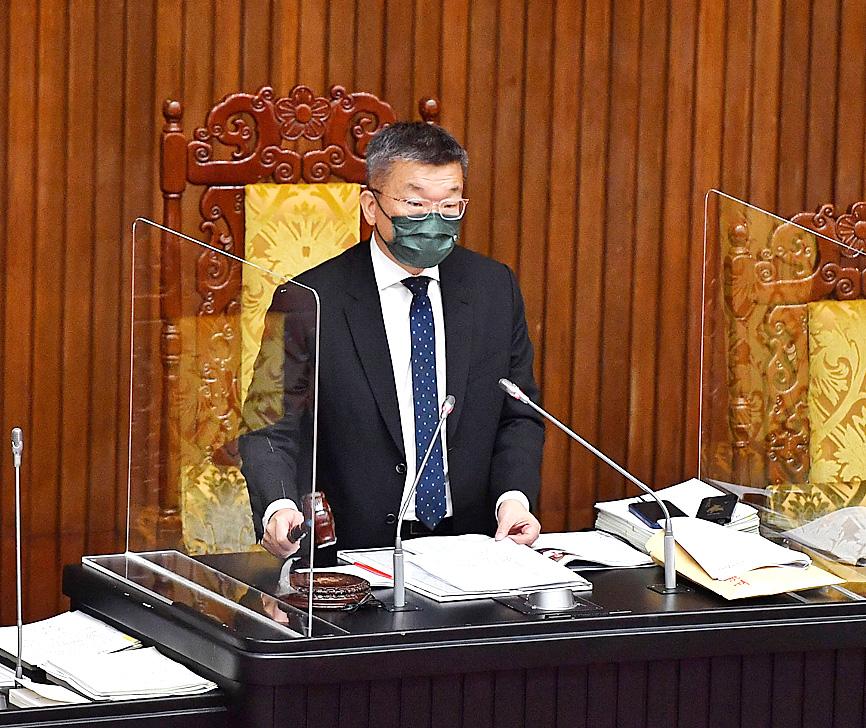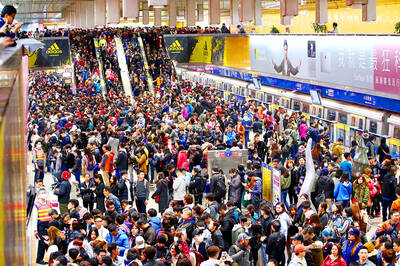The Legislative Yuan yesterday passed an amendment to the Act of Gender Equality in Employment (性別工作平等法) that would give fathers-to-be two more days of paid leave to accompany their spouse to prenatal checkups, but civic groups said that the amendment would not offer adequate support for couples who want to raise their children together.
The current regulations stipulate that employers must grant female employees five days of paid leave for pregnancy checkups. Employers should also grant male employees five days of paid paternity leave to care for their spouse and children during and after childbirth.
The amendment, which is to be implemented at a date designated by the Executive Yuan, would require employers to give female employees seven days of paid leave for pregnancy checkups, while granting male employees seven days of paid leave to accompany their spouse to pregnancy checkups, and to care for their spouse and children during and after childbirth.

Photo: CNA
However, the bill fell short of the expectations of women’s rights advocates, as they had demanded that fathers be granted seven days paid leave for prenatal checkups and another seven days paid paternity leave.
Before the bill was passed yesterday, the Awakening Foundation, the Birth Reform Alliance, the Breastfeeding Association of Taiwan and the Not So Tiny Alliance jointly launched a signature drive for people to support their version of the bill.
As of midday yesterday, more than 1,200 people had signed, they said, adding that group representatives had attended a meeting with legislative caucus whips on Monday.
“To our dismay, Democratic Progressive Party legislators, who are the majority at the legislature, went ahead and passed their own version of the bill without further negotiations with other caucuses,” the foundation said. “Their version would only extend the paid leave for fathers to seven days. Employers would only pay for five days of the leave, while the government would make up the rest.”
Seven days paid leave would put fathers in a bind, rather than helping them, the foundation said.
“If they want to be at every prenatal checkup with their spouse, they would have to go to work once the child is born. If they want to take care of their spouse and children after childbirth, they cannot be at every checkup. However, the law gives pregnant women seven days paid leave for pregnancy checkups and eight weeks of maternity leave,” it said. “The shows that the act has essentially reaffirmed the notion that pregnancy and childbirth are a woman’s duty and a man’s limited participation in these matters is normal. Husbands seeking a full participation before, during and after childbirth must then do so at their own expense or use parental leave.”
In addition to prenatal checkups, couples need to make a lot of preparations before childbirth, from taking prenatal classes, consulting doctors and childcare specialists to redecorating their home, the Birth Reform Alliance said in a statement.
“If the Ministry of Labor thinks seven days of paid leave for fathers is enough and they can decide for themselves if they want to spend more time with their wives before or after childbirth, then should the ministry not extend the paid leave to parental leave as well?” the alliance said.
Numerous studies have shown that more spousal participation during pregnancy helps lower the risk of women experiencing postpartum depression, it said, adding that risks of experiencing postpartum depression are two to four times higher for those who do not receive adequate spousal support.

People can take the Taipei MRT free of charge if they access it at Nanjing Sanmin Station or Taipei Arena Station on the Green Line between 12am and 6am on Jan. 1, the Taipei Department of Transportation said on Friday, outlining its plans to ease crowding during New Year’s events in the capital. More than 200,000 people are expected to attend New Year’s Eve events in Taipei, with singer A-mei (張惠妹) performing at the Taipei Dome and the city government’s New Year’s Eve party at Taipei City Hall Plaza, the department said. As people have tended to use the MRT’s Blue or

Civil society groups yesterday protested outside the Legislative Yuan, decrying Chinese Nationalist Party (KMT) efforts to pass three major bills that they said would seriously harm Taiwan’s democracy, and called to oust KMT caucus whip Fu Kun-chi (傅?萁). It was the second night of the three-day “Bluebird wintertime action” protests in Taipei, with organizers announcing that 8,000 people attended. Organized by Taiwan Citizen Front, the Economic Democracy Union (EDU) and a coalition of civil groups, about 6,000 people began a demonstration in front of KMT party headquarters in Taipei on Wednesday, organizers said. For the third day, the organizers asked people to assemble

Taipei is participating in Osaka’s Festival of Lights this year, with a 3m-tall bubble tea light installation symbolizing Taiwan’s bubble tea culture. The installation is designed as a bubble tea cup and features illustrations of Taipei’s iconic landmarks, such as Taipei 101, the Red House and North Gate, as well as soup dumplings and the matchmaking deity the Old Man Under the Moon (月下老人), affectionately known as Yue Lao (月老). Taipei and Osaka have collaborated closely on tourism and culture since Taipei first participated in the festival in 2018, the Taipei City Department of Information and Tourism said. In February, Osaka represented

Taiwanese professional baseball should update sports stadiums and boost engagement to enhance fans’ experience, Chinese Professional Baseball League (CPBL) commissioner Tsai Chi-chang (蔡其昌) told the Liberty Times (sister paper of the Taipei Times) in an interview on Friday. The league has urged Farglory Group and the Taipei City Government to improve the Taipei Dome’s outdated equipment, including relatively rudimentary television and sound systems, and poor technology, he said. The Tokyo Dome has markedly better television and sound systems, despite being 30 years old, because its managers continually upgraded its equipment, Tsai said. In contrast, the Taipei Dome lacked even a room for referees